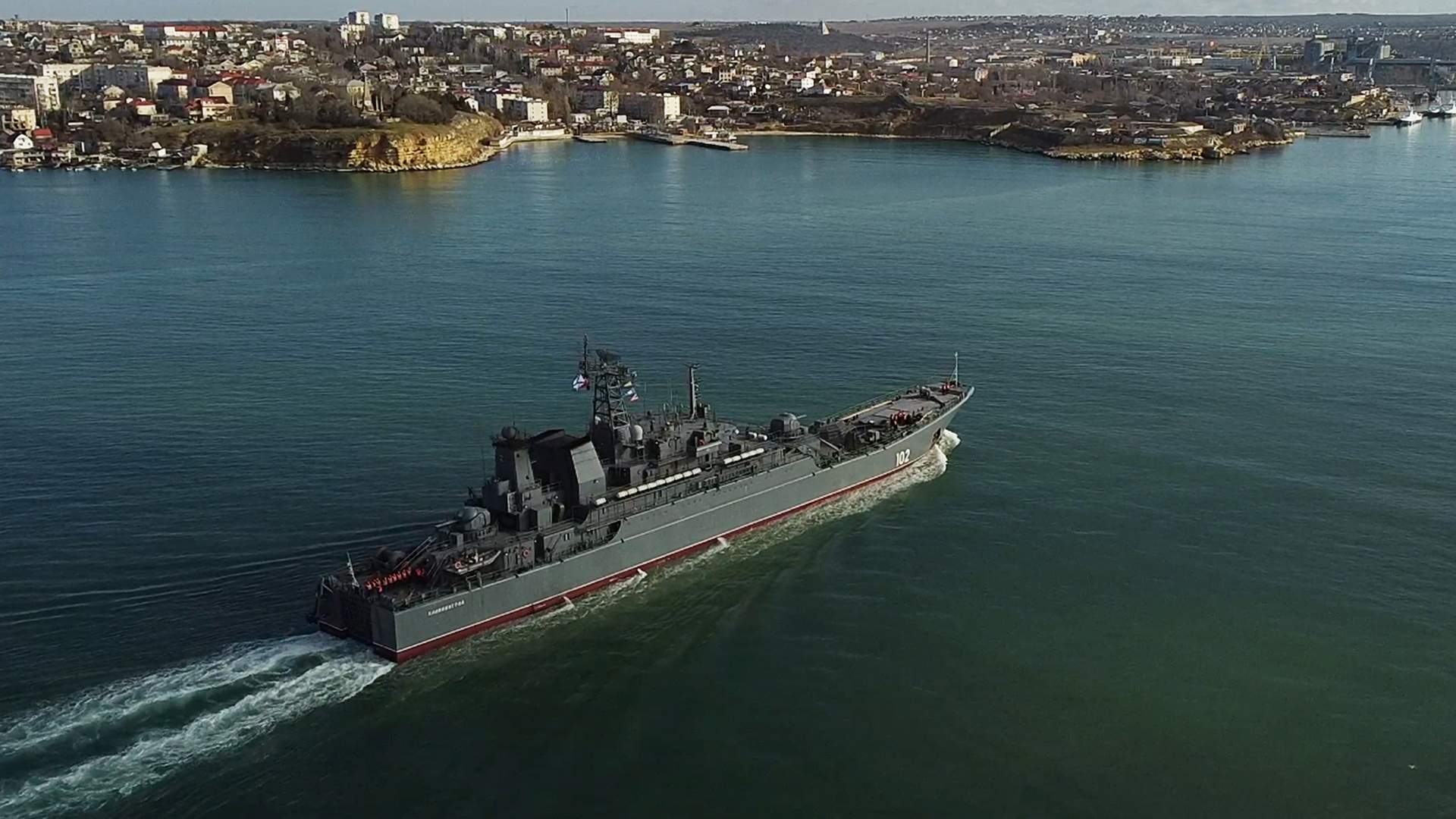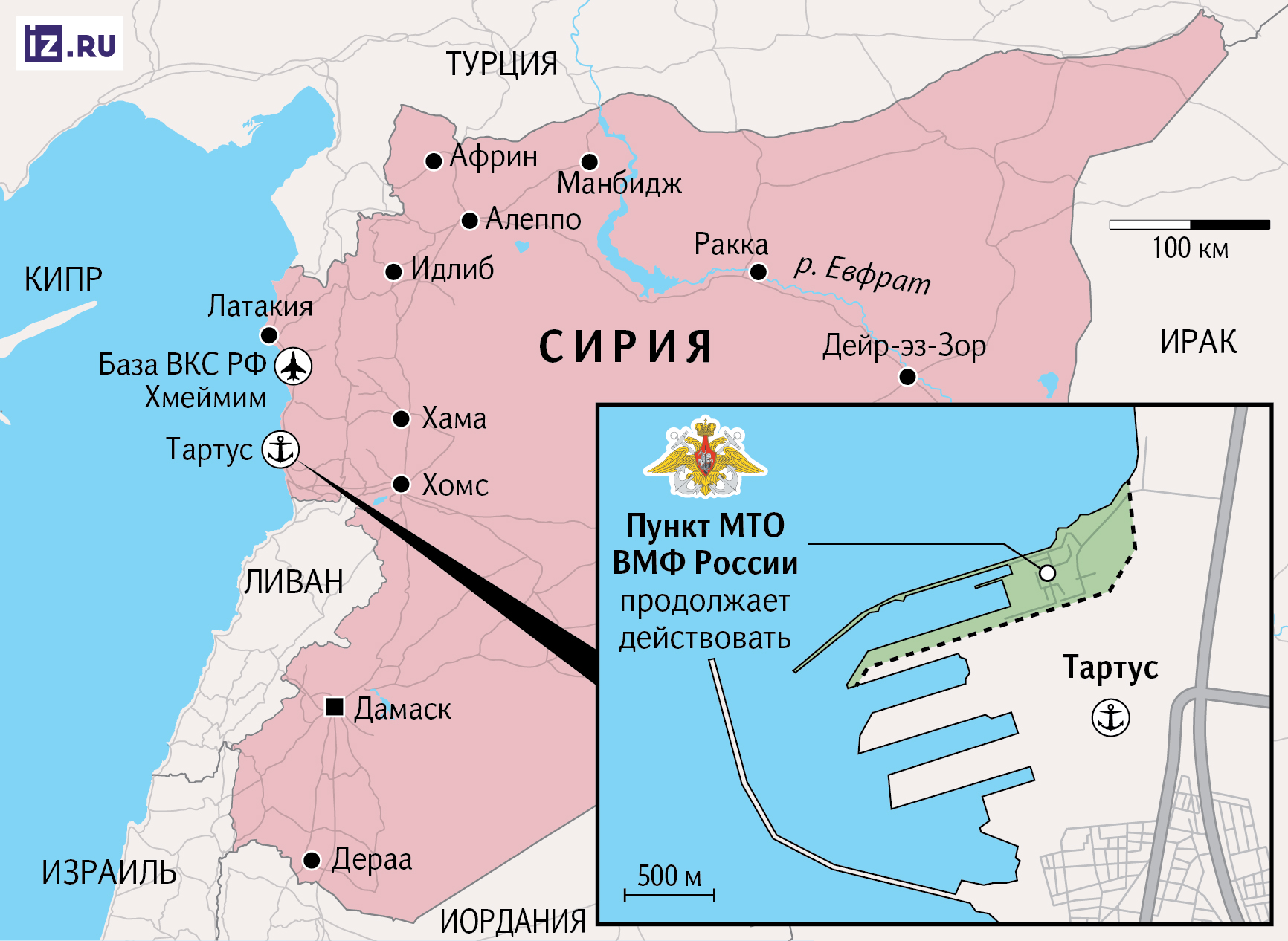- Статьи
- Army
- Putting it on Tartus: what will change for the Russian Navy in the Mediterranean Sea the closure of a port in Syria
Putting it on Tartus: what will change for the Russian Navy in the Mediterranean Sea the closure of a port in Syria

The authorities of the Syrian Arab Republic have terminated the agreement on the management of the Tartus seaport with the Russian company Stroytransgaz. At the same time, the agreement on the logistics point of the Russian Navy, concluded in 2017 between the governments of the two countries, is still in force. According to Izvestiya sources familiar with the situation, there is no talk of a complete withdrawal from Tartus yet. However, experts call what has happened an alarm bell. The Izvestia article is devoted to the prospects of our presence and possible options for supporting our fleet in the Mediterranean Sea.
An important point in the Mediterranean Sea
The new Syrian authorities terminated the agreement on the management of the seaport of Tartus with the Russian company Stroytransgaz, concluded in 2019. This was announced by the director of the customs administration of the province of Tartus, Riad Judi.
- The agreement on investment in the port of Tartous with the Russian company was canceled. All revenues from the port will be used in the interests of the Syrian state," he said.
The Russian side used the port in Tartus based on two documents.
The canceled investment contract with the Russian company Stroytransgaz was concluded in 2019 for a period of 49 years. In particular, according to it, it was assumed that the Russian side would invest $500 million in the port over four years.
The agreement between the Russian Federation and the Syrian Arab Republic on the expansion of the territory of the logistics point (MTO) of the Russian Navy in the area of the port of Tartus and the entry of Russian warships into the territorial sea, internal waters and ports of the Arab republic of January 18, 2017 is still in force.
According to the Syrian government's Defense Minister Murhaf Abu Qasr, negotiations are currently underway on the future of Russian military bases on Syrian territory, with a final solution to the issue yet to be found.
The termination of the port lease agreement is an unpleasant and alarming call for us, military expert Vasily Dandykin told Izvestia.
- This agreement concerns the commercial use of the port, its development, but not our logistics center," Vasily Dandykin said. - Nevertheless, this is an unpleasant scenario for us. We still have interests in the Mediterranean region and the Middle East. Our bases in Syria occupied key points. Of course, in Tartus we do not have a full-fledged naval base, but a basing point. Nevertheless, there are berths there where our ships and submarines operating in the Mediterranean stood. They underwent some types of repairs there. You can replenish fresh water and fuel and lubricants there, so that you don't have to bring them from afar. Of course, they can be purchased in Algeria, for example, but it takes time to solve this problem.
If we lose the base in Tartus, the Russian Navy ships will have nowhere to bunker and repair in the Mediterranean Sea, military expert Viktor Litovkin told Izvestia. He reminded that now Turkey has blocked the Bosporus and Dardanelles straits, so our ships cannot return or enter the Black Sea for the same repairs.
Nobody likes the fact that we are present in the Mediterranean Sea, and first of all the Americans and Israelis, Victor Litovkin noted.
- Syria is under pressure now, so there is a possibility that we will lose our base in Tartus," he said. - But so far the agreement has been terminated only on the port. And the port and the base are different concepts. And our leadership, knowing about this possibility, I think, is now looking for a replacement for these bases. But where they will be located is a big question. There is no firm assurance that we will be able to settle in Libya, Algeria or Egypt. In particular, we once agreed on a base in Eritrea, but at the last moment the new government came and refused us.
Kirill Semyonov, an expert of the Russian International Affairs Council, told Izvestia that the option of stationing a base in Libya seems difficult because of the de facto dual power in the country.
- If we are talking about official bases and not a gray scheme of fleet deployment, then everything is not so simple. If the Russian Federation wants an official agreement, it should be concluded with both the government in Tripoli and the House of Representatives in the east of the country. It will not be possible to simply conclude an agreement on the establishment of the base with Marshal Haftar (head of the Libyan National Army. - Ed.), who is an influential person in the east of the country," Kirill Semenov told Izvestia.
Moreover, Russia has an embassy in the west of the country in Tripoli and Russia officially recognizes the government there, the expert added.
In addition, he recalled that the issue of the base in Sudan also remains in limbo, as the war continues in the country.
Visit of dry cargo ships
The Russian dry cargo ships Sparta and Sparta II came to Tartus in the first decade of January, but all this time they were not allowed into the port by the Syrian authorities - the ships were in the outer roadstead.
According to the MarineTraffic website, the dry cargo ships are currently moored in the port of Tartus, military expert Dmitry Boltenkov told Izvestia.
"Sparta" and "Sparta II" belong to Oboronlogistics, he noted.
- It is not a secret that it is connected with the Russian Defense Ministry," the expert said. - Its vessels are used to meet the transportation needs of the military department. Their appearance in Tartus may indicate that we are taking out certain cargoes - something from military or other property that was on Russian bases in Syria. Over the years of our presence there, a lot of military property has accumulated.
Both dry cargo ships are multifunctional vessels with horizontal and vertical loading and unloading methods.
The length of the dry cargo ship "Sparta" is 126.84 meters. It can reach a speed of 15.9 knots and can carry up to 641 twenty-foot or 316 forty-foot containers. The deck can accommodate up to 35 car carriers.
The vessel "Sparta II" is designed for transportation of rolling equipment, trailers and semi-trailers, transportation of cargo in containers. It has two lower holds, a twindeck deck and one open upper deck.
The vessel's cargo areas can carry up to 213 forty-foot or 783 twenty-foot loaded containers. In addition, the vessel can carry up to 20 units of standard road trains up to 17 meters in length.

Переведено сервисом «Яндекс Переводчик»







